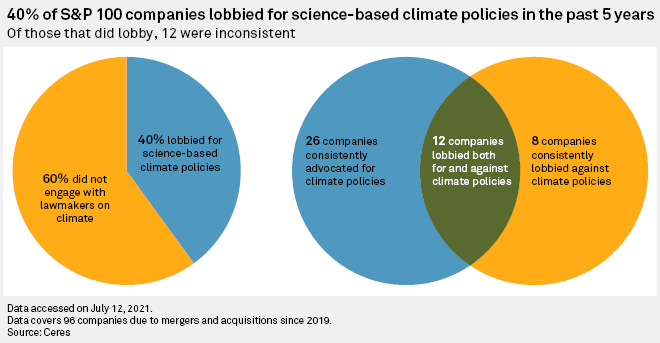Although 50 of the largest 96 corporations in the U.S. now publicly support the Paris Agreement on climate change, only 40% of those 50 companies have actively been lobbying lawmakers on the importance of science-based climate policies over the past five years, a new analysis by Ceres found.
Moreover, 12 of the companies that engaged members of Congress or state legislatures on climate issues between 2016 and 2021 vacillated between support and opposition to climate policies even as they publicly committed to cutting their own emissions, the June 13 report said.
"There are companies on both sides of this, which is part of what we want to highlight," Steven Rothstein, managing director of the Ceres Accelerator for Sustainable Capital Markets, said in an interview. "Their policies are not aligned, and their investors really want them to be."
Eight of the companies that engaged lawmakers remained consistent in their opposition to legislative efforts to reduce greenhouse gas emissions. The remaining 26 consistently supported such policies in their lobbying.
The detailed data showing how the nation's largest firms handle climate lobbying helps companies see how they stack up against their competitors while exposing those who fall short, Rothstein said. The assessment included all S&P 100 firms as of May 2019, but the Ceres list shrunk to 96 after several mergers and acquisitions took place in the last few years.
Among companies that lobbied on both sides of the climate issue were Duke Energy Corp., Exxon Mobil Corp., General Electric Co., Berkshire Hathaway Inc. Ford Motor Co. and General Motors Co. Companies that consistently advocated against state and federal policies to address climate change included Southern Co., Chevron Corp., Occidental Petroleum Corp., Lockheed Martin Corp. and The Boeing Co., Ceres reported.

The Ceres report follows revelations in late June that a senior lobbyist for Exxon had actively sought to undermine key parts of President Joe Biden's most ambitious climate initiative, the American Jobs Plan, while the oil company publicly advocated for a carbon tax it knew would never be proposed. The video sting by an investigative reporter with the Greenpeace news outlet Unearthed prompted a public apology from the lobbyist and from Exxon CEO Darren Woods.
But the group's report also comes in the midst of a record-breaking proxy season during which some of the world's largest companies have been rebuked for not doing enough to tackle climate change and social challenges. As of late June, eight climate proposals had received large majority votes during the shareholder meetings of major corporations, according to a recent tally by the Sustainable Investments Institute.
One such resolution called on Phillips 66 to report whether its lobbying activities are consistent with the Paris Agreement, and another requesting that Exxon disclose all its climate lobbying activities. A majority of shareholders for United Airlines Holdings Inc. and Delta Air Lines Inc. passed similar lobbying disclosure proposals in recent weeks.
Other companies face significant pressure from investors. Duke Energy shareholders rejected a shareholder proposal in May asking the utility to produce an annual report on its lobbying expenses, but only after 42% voted in favor of the plan.
Some large corporations have taken steps over the past several years to become more transparent about their carbon footprints and revised their advocacy accordingly, a trend that Rothstein said is accelerating. Ceres found, however, that while nearly three-quarters of companies it assessed belong to the powerful U.S. Chamber of Commerce, only eight had urged the chamber to "evolve its climate policy positioning" over the past five years.
The trade association has a well-documented history of opposing federal climate policies but changed its stance in January as President Biden took office. The group now calls for "market-based" policies by Congress to reduce emissions, although it has not specified net-zero goals. At least one high-profile member of the chamber defected over the group's climate lobbying in recent years, and just last month, a coalition of more than 25 environmental and student groups called on more companies to do so.



